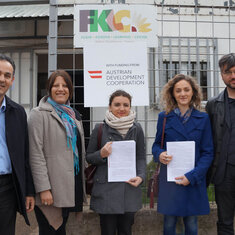Pagecontent
Integration works
Three local organisations – Balkan Sunflowers Kosovo (BSFK), Play for Youth International (PL4Y) and The Ideas Partnership (TIP) – will continue their work on empowerment of Kosovo minorities over the next three years. The Austrian Development Agency supports the cooperation of these nongovernmental organisations with 450.000 Euro.
Proper education
"We continued our support to this project because children of the Roma, Ashkali and Egyptian communities deserve proper education. With this project, especially its education, advocacy, social inclusion, and sports components, we manage to offer a great deal of support to many children. This is of extreme importance, and I also encourage the Kosovo Government to do its best to provide equal access and treatment in education to the country's RAE communities.", said Christian Geosits on the occasion of the signing ceremony on 23rd March 2016 in Pristina. The project aims to increase the integration of minority communities in Kosovo through enhanced education, interethnic dialogue and empowerment. The consortium will strive to increase the access to education, empower youth and adults and advocate for the institutionalisation of the learning centres programme. In particular, the project addresses the needs of non-majority communities and will aim to provide for the immediate needs for integration of Roma, Ashkali and Egyptian communities. By the end of the project, almost 2.000 children will have benefitted.
Trainings & Activites
Activities to be undertaken respond to the needs of the communities in four Municipalities of Kosovo: Fushë Kosovë/Kosovo Polje, Lipjan/Lipljan, Shtime/Stimlje, Obiliq/Obilic. During the project, learning programmes will be implemented, special activities for pre-school and kindergarten children as well as inclusive sport activities will be offered. Families in need will be supported financially, and medical visits, lectures on health and nutrition are planned. Project staff will be trained on disabilities and an action plan to prepare the integration of beneficiaries with special needs in project activities will be designed. Furthermore, advocacy trainings for staff and volunteers will be offered. The project has important gender aspects such as fighting early marriage while persuading young girls to stay in school.

